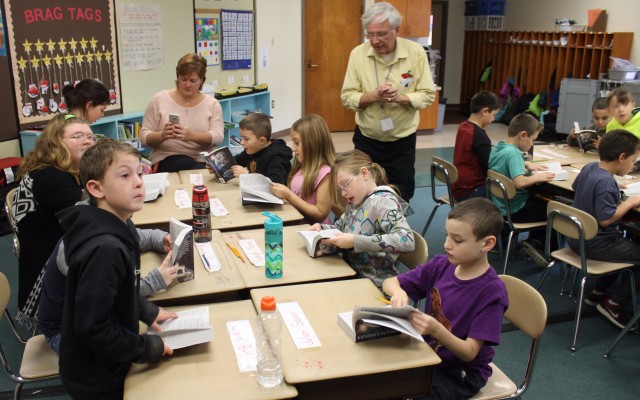
Valley Grange gives the gift of words at Brownville Elementary
BROWNVILLE — For the region’s grade 3 students, reaching this grade level means not only learning multiplication tables and turning 9 years old but also receiving a dictionary from the Valley Grange of Guilford through its Words for Thirds Dictionary Project.
The program began a decade and a half ago with third-graders in the Guilford-based SAD 4 being presented with dictionaries from the Valley Grange. In the years since, the Words for Thirds Dictionary Project has expanded to include RSU 68 in Dover-Foxcroft, SAD 41 in Milo/Brownville and SAD 46 in Dexter with over 1,800 of the reference guides being handed out in 15 years.
The three SAD 41 grade 3 homerooms, now located at the Brownville Elementary School, had their turn on the morning of Nov. 21 with Walter Boomsma and Bob Carroll of the Valley Grange handing out the dictionaries after a classroom lesson.
“We’re kind of like a club that’s called the Grange and we are here to do a few things with you, and one of those things is tell you about the Grange,” Boomsma told the 16 students in Andrea Mills’ class. “The Grange is a really old organization started after the Civil War by farmers.”
Boomsma said four farmer’s tools are still used in Grange meetings as he showed the pupils the four tool staves. He said the spud “kind of reminds us to get rid of things that don’t belong — like being mean to each other.”
The pruning hook serves a similar purpose. “We want to get rid of the stuff that’s bad, like bullying and bad words,” Boomsma said.
Holding the shepherd’s hook, he said, “We use this in our meetings because it’s important that everybody be a leader.”
The fourth tool features an owl and Boomsma had the students guess what this staff is used for.
“It’s to keep animals away from the garden,” third-grader Liam Atkinson said.
“The owl reminds us to keep watch on what’s around us,” Boomsma said.
He then said Grange members are called Patrons of Husbandry. “There’s two words I think most of you don’t know and I don’t want you to guess, so what do you do if you don’t know what a word means?”
Mills’ class knew that they can look up the definitions of the unknown words in a dictionary as Boomsma and Carroll handed out a book to each student. The classroom was already divided into two groups of eight desks as each side had patron or husbandry.
“We are called patrons because we provide support and one of the ways we provide support is by giving you support,” Boomsma said, saying the dictionaries are for the students to keep. “We have been doing this 15 years and we know kids who have kept their dictionary for 15 years.”
After a few games, such as seeing who could be the first to find a definition in a “dictionary race,” Boosma asked the third-graders what they learned.
“What steward and cultivate mean,” Atkinson said.
“How to find words in the dictionary,” Wyatt Romero said.
“Dictionaries don’t just have words but states and how many different people live in the states,” Kylie Smith said.
“The owl scares away animals,” Carleigh Farrar said.